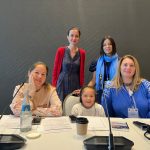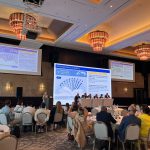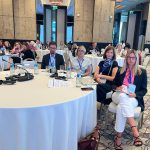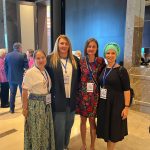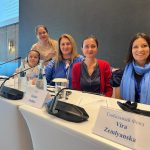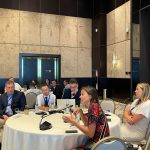On September 19-20, a regional working meeting on Pandemic Preparedness, Migration, and Health: Innovations and Adaptation of Global Fund Grants to Migration Realities in Eastern Europe and Central Asia (EECA) was held in Samarkand.
The meeting was attended by the leaders of the Sanitary and Epidemiological Wellbeing and Public Health of the Republic of Uzbekistan, the national and regional AIDS centers, representatives of the Global Fund, IOM, UNDP, EJAF, GIZ, WHO Euro, UNAIDS, the Alliance for Public Health, AFEW, REG, as well as international experts and representatives of organizations from EECA region countries, including Armenia, Albania, Afghanistan, Georgia, Kazakhstan, Moldova, Kyrgyzstan, Kosovo, Tajikistan, Montenegro, Uzbekistan, and Ukraine.
A special focus was placed on speeches by two Ukrainian women, Natalia and Iryna, along with Iryna’s 9-year-old daughter, who were forced to move to Poland due to the war. Natalia shared her personal experience of living with HIV in the context of migration. She spoke about how she initially became a client and later a consultant and activist for the #HelpNOW HUB, helping other Ukrainians facing similar issues. Iryna shared the tragic story of her family, which lost their father to multi-drug resistant tuberculosis, while her young daughter continues to battle the disease. The presence of the little girl deeply moved all participants. These stories highlighted the incredible challenges Ukrainian refugees face when seeking medical help in foreign countries, such as language barriers, unfamiliar legal systems, and bureaucratic obstacles.
Dumitru Laticevschi, Regional Manager of Eastern Europe and Central Asia Team, The Global Fund, said that the experiences presented at the meeting regarding work with migrants would influence the development of new grant programs. He emphasized the importance of this work in achieving global HIV/AIDS and tuberculosis goals in the region. Migrants are not just program clients; they are people with diverse needs who often face significant challenges adapting to new living conditions. One of the main barriers to receiving necessary medical care is the language barrier, as people tend to delay seeking medical assistance without understanding the language.
Tatiana Deshko, Director of the International Programs Department of the Alliance for Public Health, presented the experience of the regional project #SoS 2.0 (2022-2024). She outlined approaches to ensuring service continuity for migrants at a cross-border level. From 2022 to 2024, Ukraine experienced an unprecedented migration crisis, with over 8 million Ukrainians forced to leave their homes, marking the largest population movement in Europe since World War II.
As a relevant example, Tatiana Deshko shared the lessons learned from the #HelpNOW HUB platform, which assisted 37.5 thousand Ukrainians in 50 countries worldwide between 2022-2023. This platform connected migrants receiving HIV, TB, and addiction treatment with services both within and outside Ukraine. She emphasized the following key points:
- The Importance of Humane State Migration Policies: The policies of host countries play a crucial role in the treatment of migrants. The EU and Moldova, for example, became models of support for HIV and TB patients, particularly those from Ukraine.
- The Critical Role of Digital Solutions: Digital platforms such as #HelpNOW HUB and the telemedicine service Help24 were pivotal in providing assistance to migrants. For example, Telegram became one of the most popular messengers for communicating with the #HelpNow service. However, in countries with established hotline infrastructures (Poland, Germany), 60% of inquiries were received through traditional hotlines, indicating that a combination of digital and conventional communication channels is most effective.
- The Human Factor and the Development of AI Consulting Technologies: Personal communication with consultants remains vital for providing comprehensive support to migrants. At the same time, innovative technologies like the AI-based digital consultant TWIIN (www.twiin.aph.org.ua), an online assistant available 24/7, can greatly enhance the capabilities of social workers.
- Expanding Telemedicine Services: The Help24 platform (https://help24.org.ua) was significantly expanded, providing telemedicine services through public clinics, adding medicine delivery and psychological support services. For migrants, this serves as an essential link to medical professionals in a language they understand.
- Mental Health: Migrants’ mental state upon contacting services was often very poor. Migrants frequently experience high levels of stress, making it crucial to focus on burnout prevention.
- Productive Partnership Between NGOs and the State: From the early days, the Ukrainian Center for Public Health actively promoted the service in Ukraine and abroad. It was the primary provider of referral and remote medical support services and quickly developed a mechanism to restore and provide patient documentation in friendly clinics online.
- Use of Long-Acting Medications: The introduction of long-acting drugs (Buvidal for OST and Cabotegravir for PrEP) in Ukraine was an important step in ensuring service availability for migrating key populations.
The Alliance for Public Health has documented the lessons learned from program adaptations in Ukraine, with results available on their website.
Participants noted that these lessons are relevant not only for working with migrants but also for reforming the healthcare system towards a more patient-centered, effective, and cost-efficient model.
In summarizing Tatiana Deshko’s presentation, session moderator and Global Fund Program Specialist Vira Zemlyanska highlighted that the #HelpNOW service, created through the leadership of the Alliance for Public Health and unique support from over 100 global organizations, is effectively a patient-oriented one-stop shop for Ukrainians, regardless of where they are in the world. The #HelpNOW experience can be adopted by other countries or used on other regional platforms.
“We welcome the recommendation from the Global Fund meeting in Samarkand to include migrant-sensitive services in current Global Fund applications for country financing and, if necessary, to reprogram existing grants. We also note significant calls from meeting participants to conduct research to build an evidence base and, where necessary, identify migrants as a key population,” said Daniel Kashnitsky, Coordinator for Academic Relations at the Regional Expert Group on Migrant Health. “The Regional Expert Group on Migrant Health also welcomes the readiness of healthcare authorities in EECA countries to implement remote diagnostic and treatment practices for citizens living abroad. We hope that similar high-level donor meetings on migrant health will be held regularly.”
For more information on the SoS 2.0 regional project, visit the official websites:
– Alliance for Public Health – https://aph.org.ua
– SoS Project 2.0 – www.sos.aph.org.ua



